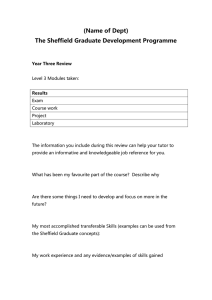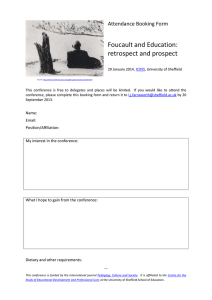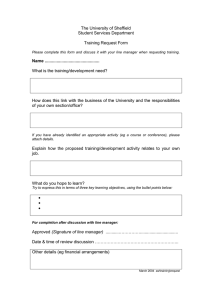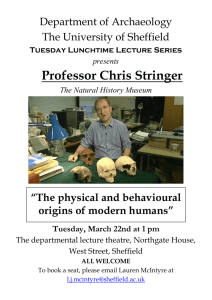Fitting the jigsaw together: developing and promoting employability Learning & Teaching Conference 2011
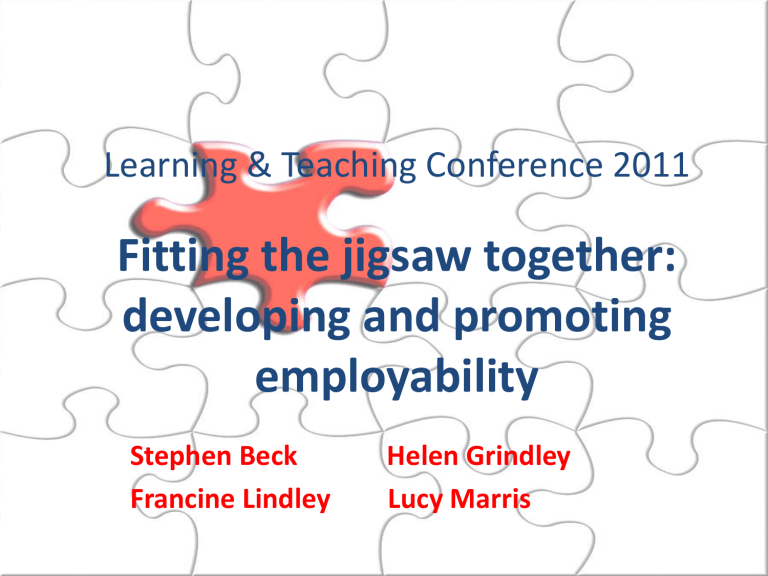
Learning & Teaching Conference 2011
Fitting the jigsaw together: developing and promoting employability
Stephen Beck Helen Grindley
Francine Lindley Lucy Marris
The Sheffield Graduate
• knowledgeable in their subject area
• a critical, analytical and creative thinker
• an independent learner and researcher
• a problem solver
• information literate and IT literate
• a flexible team worker an accomplished communicator
• an efficient planner and time manager
• competent in applying their knowledge and skills
• an active citizen who respects diversity
• professional and adaptable reflective, self aware and self-motivated
The Sheffield Graduate
• Why should we care about this?
• Is employability important?
The Sheffield Graduate
Development Programme
Why prepare graduates for employment?
• As a top quality university, one of our aims is to
“educate students for life”.
• This means not only to provide students with a love of learning, but to enable them to use that for an interesting career.
• The aim was to ensure that all students graduate with a range of transferable skills to employability of our graduates.
Three models
1. Vocational type courses which prepared students for professional practise. (e.g.
Engineering and Medicine)
2. The tutor led method: where small groups can be used to discuss transferable skills
(used in many Arts departments).
3. The dedicated module: ideal for large departments (parts of Social Science) where cohorts can be educated.
Using the models
1. For vocational type courses, it is important to document and monitor where the developmental activities are taking place, e.g.
Architecture, TRP, medicine
2. The APS model uses tutor led sessions
3. The Management School has developed module based packages
These examples can be customised and adapted for other departments to use.
The Sheffield Graduate Award
Recognising and rewarding valuable skills and experience gained through extra curricula activities during university degree courses
Background
• Framework for Award derived from the Sheffield Graduate concepts
• Award includes diverse range of extra curricula activities
• Open to all students
• In fifth year of operation
• Students can enrol at any time
• Academic board meeting twice yearly
Issues
• Assessment of increasing numbers of paper based portfolios
• Determining the eligibility of activities that students wish to include in their Award portfolios
• Monitoring individual students progress throughout the process
• On going judgement required as to suitability of students activities and how they wish to use them
• Ensuring the university continues to take the
Award seriously, e.g. inclusion on student transcript at graduation
Maintaining Standards
• Provide levels of individual support, e.g. Feedback on draft portfolios
• Each students’ experience is different – no standardisation
• Some disciplines find writing reflectively easier than others
• Some students require more hand holding than others as there is no right or wrong way – often deeply personal experiences
• External examiners meeting to discuss borderline cases
• Award aims to adopt the university guidelines on submission and assessment criteria
Quality Assurance
• Assessment criteria offers guidance and provides transparency as far as possible
• Students level of understanding of what is required variable – particularly international students
• Pass/Fail only, but often variation between good and just passed
• Students need incentives to take part in Award
– often focussed on course and exam results only
Despite All…
• Supports holistic view of higher education
• Students greatly value doing the Award – pulls together all they have done and improves self confidence/self awareness
• Staff very supportive and recognise the Award adds value to students’ university experience
• Further work is required, but DLHE data indicates that Award students are ‘more likely to be employed in graduate jobs’ (2007/8 data)
• Potential for inclusion in the HEAR???
Employability and the Careers Service
Not just a degree…
Employability in the curriculum?
• critical and analytical thinking;
• planning and organisation;
• research methods;
• time management;
• project management;
• advanced IT skills;
• presentation skills;
• group/team working.
The essential components of graduate employability
Employability
Self-esteem
Self-efficacy
Self-confidence
Reflection and
Evaluation
Career
Development
Learning
E xperience
(Work & Life)
D egree Subject
Knowledge,
Understanding
& Skills
G eneric Skills
E motional
Intelligence
Dacre Pool & Sewell (2007)
Career Management Skills
•
•
•
•
•
Developed by the
Careers Service
20 credit module
Level 2 students
Free elective
Available Autumn 2011
Draws on: ‘DOTS’ model
• Self Awareness
• Opportunity Awareness
• Decision Making
• Transition Skills/Taking
Action
Helping students recognise and fulfil their potential….
Law, B. and Watts, A.G. (1977) Schools, Careers and Community. London.
Church Information Office.
Stand out from the crowd
Over to you
You have seen a few models of preparing graduates for their next steps
• What else can be done?
• What have you done or seen that helps students on their journey to become
“Sheffield Graduates”
How do we capture these?
• Getting students to sell themselves
• Helping them to sell themselves
• Enabling employees to see how good our graduates are.
Over to Helen
17/04/2020
Higher Education
Achievement Report
(HEAR)
© The University of Sheffield
HEAR serves two functions
• As a formative document - developed over a student’s University career for use as a pedagogic tool and to assist student’s own career development
• As a formal exit document – made available to a student at the point of graduation to assist in marketing their knowledge, skills and experience to employers.
17/04/2020 © The University of Sheffield
HEAR Document
The format of the HEAR is based on:
– Academic Transcript and
– European Diploma Supplement and
– Additional information (extra-curricular)
The HEAR is intended to be delivered primarily as an online/electronic document, but may also be issued as a paper-based document.
17/04/2020 © The University of Sheffield
HEAR - Academic Information
• Programme/Curriculum information
(inc. regulations, aims, learning outcomes)
• Module/unit results (inc. ECTS equivalences)
• Degree award information
• Professional accreditation
• Study/work placement information
17/04/2020 © The University of Sheffield
HEAR - Additional Information
• Additional Awards – accredited performance in non-academic contexts
• University, Professional and Departmental
Prizes
• Additional Recognized Activities – demonstrating achievement but for which no formal recognition is provided in terms of academic merit
17/04/2020 © The University of Sheffield
HEAR – Some Key Issues
• How might the HEAR be best used?
• Who will be responsible for verifying and validating additional recognized activities , and loading the information onto central systems?
• What about students for whom the additional recognized activities section of HEAR may be blank?
• Will employers read the HEAR?
• What say will students have in what is included on their HEAR?
• What level of detail should be included on the HEAR, whilst still adhering to the national agreed format?
17/04/2020 © The University of Sheffield
Over to you
• What uses can you see for the HEAR?
• How might HEAR tie in with student
‘employability’ activities or initiatives that you are engaged with?
Want further info?
Stephen Beck s.beck@sheffield.ac.uk
Helen Grindley h.grindley@sheffield.ac.uk
Francine Lindley f.p.lindley@sheffield.ac.uk
Lucy Marris lucy.marris@sheffield.ac.uk
